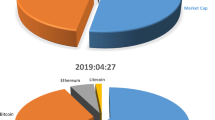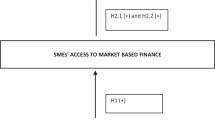Abstract
With new technically advanced methods and computers at our disposal, the efficient market hypothesis is once again being debated. At the same time, we are witnessing an unprecedented growth in both existing and new financial markets. These new markets are often in economies which have just recently embraced free market economics; we term these stock markets infant markets. Such stock markets are obviously not efficient in allocating the supply of savings to productive capital. We do not test whether or not these infant markets are informationally efficient, but instead examine whether and how they are becoming more efficient. We propose modelling the excess returns of individual securities using a multi-factor model with time-varying coefficients and generalised auto-regressive conditional heteroskedastic (GARCH) errors. If the markets are becoming more informationally efficient or the agents are learning, we would expect this to manifest itself as the time-varying coefficients becoming more stable as time increases. We test our model using data on four Bulgarian shares. First, we estimate an AR(2) model and a GARCH-M(1,1) model for the shares. Then, we estimated our AR(2) model with time varying coefficients and GARCH type errors. We find varying levels of efficiency and varying speeds of movement towards efficiency within our sample of four shares.
Similar content being viewed by others
References
Baillie, R.T. (1989), 'Econometric Tests of Rationality and Market Efficiency', Econometric Reviews, 8, 151-186.
Cornelius, P. K. (1994), 'A Note on the Informational Efficiency of Emerging Stock Markets', Welt wirtschaftliches Archiv, 24, 820-828.
Dwyer, G. P. and M.S. Wallace (1992) 'Cointegration and Market Efficiency', Journal of lnternational Money and Finance, 11, 318-327.
Fama, E. (1970) 'Efficient Capital markets: A Review of Theory and Empirical Work', The Journal of Finance, 25, 383-417.
Hall S.G. and D. Miles (1992),'Measuring Efficiency and Risk in the Major Bond Markets', Oxford Economic Papers, 44, 599-625.
Harvey, A.C. (1987), 'Applications of the Kalman Filter in Econometrics', in T.F. Bewley (ed.) Advances in Econometrics: Fifth World Congress, vol.1, Econometric Society Monograph No.13, Cambridge University Press.
Author information
Authors and Affiliations
Rights and permissions
About this article
Cite this article
Emerson, R., Hall, S.G. & Zalewska-Mitura, A. Evolving Market Efficiency with an Application to Some Bulgarian Shares. Economics of Planning 30, 75–90 (1997). https://doi.org/10.1023/A:1003053807165
Issue Date:
DOI: https://doi.org/10.1023/A:1003053807165




